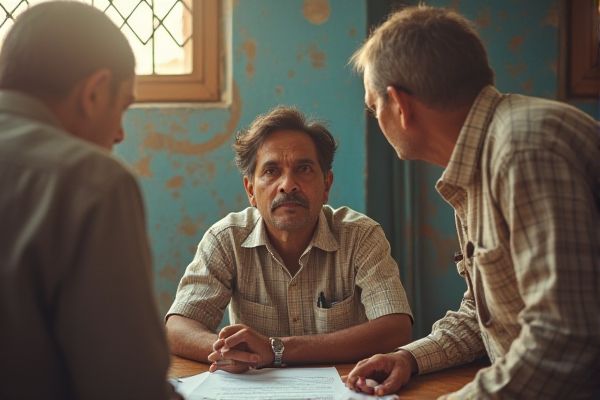
India offers a diverse range of humanitarian job opportunities across various sectors, including NGOs, international organizations, and government initiatives. Positions often focus on areas such as disaster management, health care, education, and community development, catering to vulnerable populations like women, children, and marginalized communities. Professionals in these fields may undertake roles in program management, advocacy, research, and fieldwork, fostering the implementation of impactful projects. Many organizations seek individuals with skills in capacity building, project evaluation, and intercultural communication to address complex social issues effectively.
Job Description
Humanitarian jobs in India involve a range of activities aimed at improving lives and providing support to vulnerable communities. These positions often require skills in project management, community engagement, and capacity building, addressing various issues such as health, education, and disaster relief. Organizations seek individuals who possess cultural awareness and adaptability, as working in diverse environments is crucial for success. Opportunities can be found across NGOs, government programs, and international agencies, allowing you to make a significant impact in your community.
Requirement
Humanitarian jobs in India often require a strong educational background in social sciences, public health, or international relations. Relevant work experience in non-profit organizations, community development, or disaster relief is highly beneficial. Proficiency in local languages can enhance communication with diverse communities, making candidates more competitive. Familiarity with government policies and NGOs operating in India is crucial for effectively navigating the humanitarian landscape.
Salary and Perks Expected
Humanitarian jobs in India vary significantly in salary and perks depending on the organization, role, and location. Entry-level positions may offer salaries ranging from Rs20,000 to Rs30,000 per month, while experienced professionals can earn upwards of Rs70,000 per month or more. Many organizations provide additional benefits such as health insurance, travel allowances, and opportunities for professional development and training. Working in this field allows you to make a meaningful impact while enjoying diverse experiences and networking opportunities in India's vibrant communities.
Similar Job Names
- Program Officer
- Field Coordinator
- Project Manager
- Monitoring and Evaluation Specialist
- Humanitarian Affairs Officer
- Logistics Officer
- Community Engagement Manager
- Health Program Coordinator
- Protection Officer
- Shelter Program Manager
- Disaster Risk Reduction Specialist
- Finance Officer
- Advocacy Officer
- Training and Capacity Building Officer
- Research Analyst
- Emergency Response Coordinator
- Social Worker
- WASH (Water, Sanitation, and Hygiene) Specialist
- Nutrition Program Officer
- Communications Officer
Job Expectation Concept
In the humanitarian sector in India, job expectations encompass a blend of skills such as project management, cultural sensitivity, and effective communication. Organizations seek individuals who can navigate the complex landscape of diverse communities while addressing urgent needs in areas like health, education, and disaster relief. Your ability to work in dynamic environments and collaborate with various stakeholders is crucial for ensuring program success. Understanding local contexts and adapting strategies will enhance the impact of your contributions in this vital field.
Career Advantage and Weakness
Humanitarian jobs in India offer a significant career advantage by providing opportunities to work directly with underserved communities, making a meaningful impact on lives. These roles often come with the chance to develop essential skills such as project management, advocacy, and cross-cultural communication, enhancing your professional profile. However, a notable weakness is the competitive nature of the sector, leading to limited job availability and potentially lower financial compensation compared to corporate positions. Additionally, the emotional toll of dealing with crises and difficult situations can be challenging for many individuals in such roles.
Important Thing Must Know
Humanitarian jobs in India offer diverse opportunities for individuals passionate about making a difference in communities. Organizations like the United Nations and various non-profits focus on issues such as disaster relief, public health, and education, creating impactful roles. Skills in project management, social work, or public policy can enhance your prospects in this sector. Networking within humanitarian circles and gaining relevant field experience can significantly improve your chances of securing a position. Understanding local cultures and languages often enhances effectiveness in these roles, forming deeper connections with the communities you aim to serve.
Alternative Career Options
Humanitarian jobs in India often lead individuals toward alternative career paths that emphasize social impact and community development. You can explore roles in non-profit organizations, working on initiatives related to education, health, or women's empowerment. Consulting for international development agencies presents opportunities to utilize your skills in project management and policy analysis. Additionally, engaging in corporate social responsibility within businesses offers a way to align commercial success with social benefits, fostering sustainable development in local communities.
Companies List
- United Nations Development Programme (UNDP)
- International Federation of Red Cross and Red Crescent Societies
- Oxfam India
- CARE India
- Save the Children India
- Act for Humanity
- World Food Programme (WFP)
- ActionAid India
- Mercy Corps India
- Plan India
List of Ideal City
Cities such as Delhi, Mumbai, Bengaluru, and Hyderabad stand out as prime locations for humanitarian jobs in India. Delhi hosts numerous NGOs and international organizations, making it a hub for policy-making and advocacy work. Mumbai's diverse population and financial resources attract various initiatives focused on poverty alleviation and education. Bengaluru is known for its innovative tech solutions, addressing social issues, while Hyderabad offers opportunities in health and community development projects.
 jobs-india.net
jobs-india.net